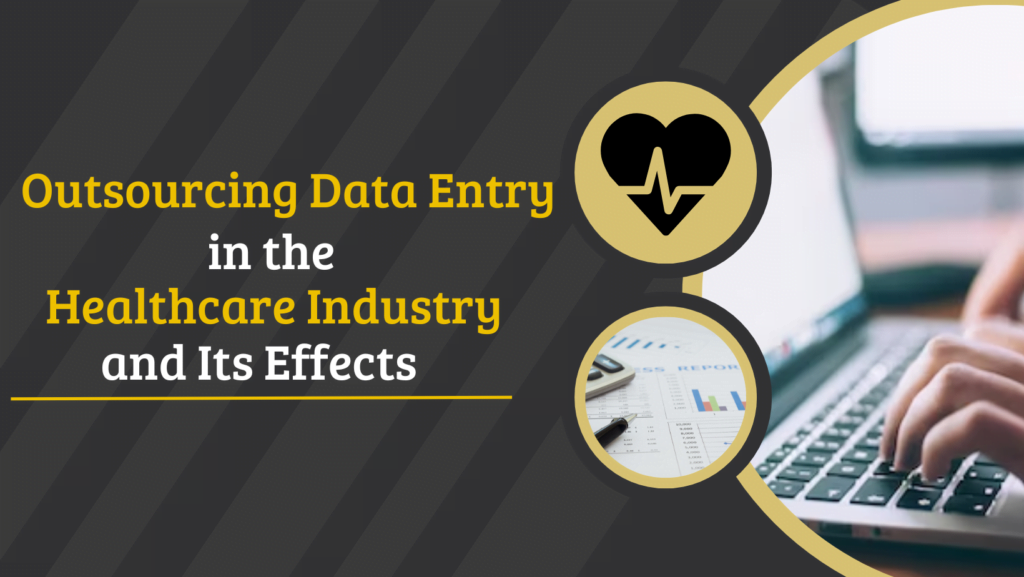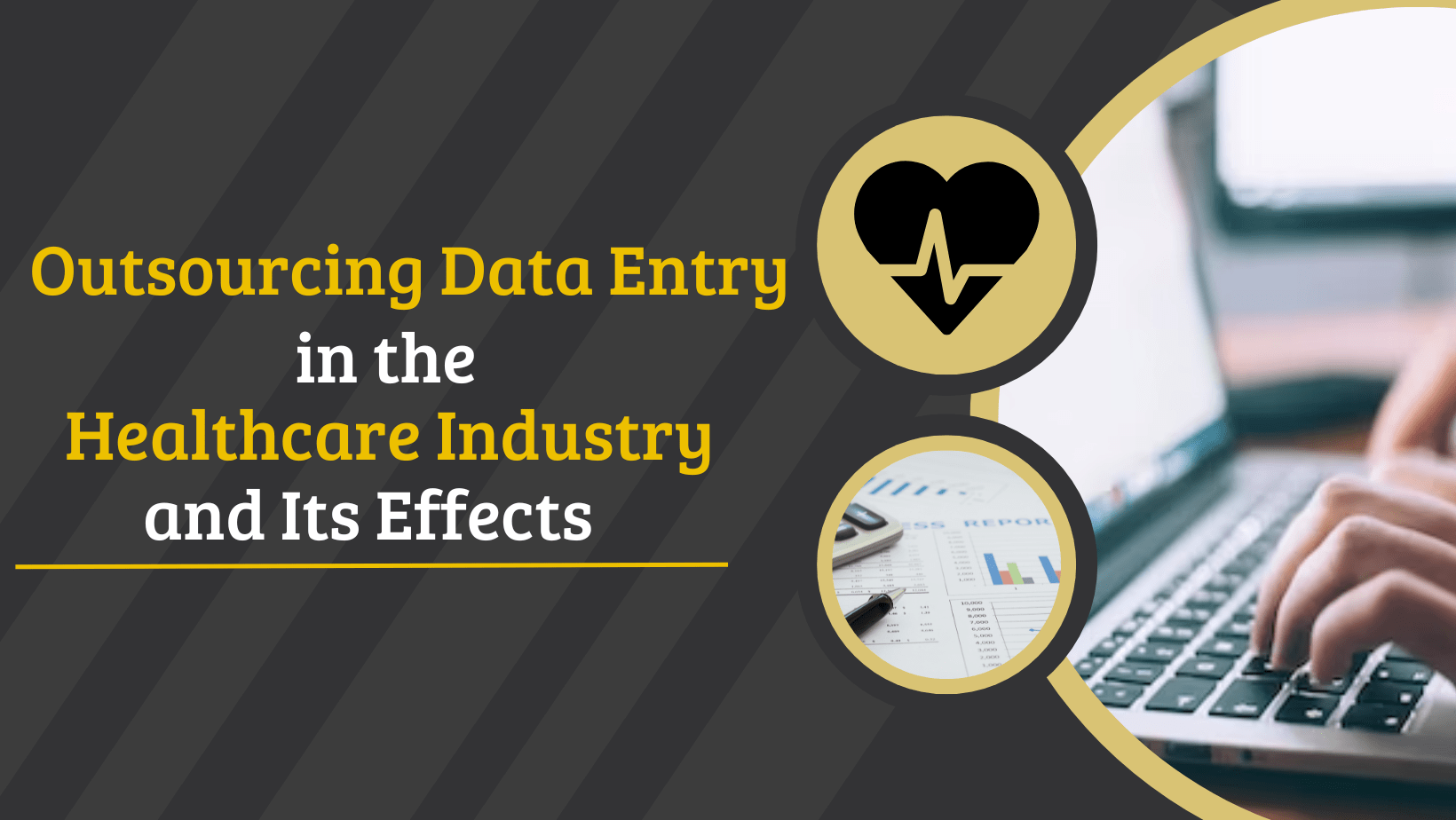Medical records have always remained proprietary information to healthcare organizations. Electronic medical records (EMRs) help hospitals to store and retrieve medical records more effectively, rendering them quickly when needed. The benefits derived from EMR are manifold: accurate data, real-time information, saving time and staff costs, and many more!

Healthcare data is the backbone of any hospital. It’s the key to treating, diagnosing, and rehabilitating patients. However, technology has not been able to keep up with the industry’s demands for digitalization, leaving countless hours to be spent manually entering data into systems. In this scenario of increasing demand, seeking expert medical data entry services has become a necessity for hospitals worldwide. This article will show how the healthcare industry has been saved through such expert services.
Data Entry for Healthcare – Digital Transformation in the Post-Covid World
Data-driven healthcare is being realized by hospitals and other medical institutions to become more efficient and economical. The need for streamlining medical data has led to business continuity at hospitals, which has helped them improve the quality of service. Furthermore, digitization of healthcare information brings an opportunity to save millions of dollars worth of expenditure on healthcare systems and computer software.
During the COVID-19 crisis, the need for digitization in the medical industry became all the more clear. Hospitals were faced with data they couldn’t manage and were forced to seek digitization services. The industry saw a massive increase in data, financial information, records of medications, and vital information, all of which came with a lot of paperwork. In return, seeking professional healthcare data entry services has helped hospitals deal with their data efficiently.
1. Data Storage
Healthcare records are the most significant aspect of a hospital’s management. The quality of these records depends on the healthcare professionals who compile them and store them efficiently. Any mistakes in maintaining these records can result in unnecessary expenditure, losses, and damage to your hospital’s reputation. Moreover, doctors spend a great deal of time maintaining their records by noting information like patients’ names and ages. Healthcare data entry services were extensively used during the pandemic, which helped hospitals save time and effort while keeping the record accurate and portable.
2. Secured Data for Patients
Healthcare data is all over the place, held by multiple sources, and stored in various formats. 90% of organizations suffer from some kind of data breach as they are prone to be targeted by black hat hackers and other cybercriminals who thrive on stealing sensitive information, which can be abused for monetary gain.
The healthcare industry is among the most valuable players in today’s cybersecurity landscape. This population is growing rapidly, which means that the amount of sensitive patient data stored in each facility has increased rapidly. Concerned patients may resist sharing their personal information with a new doctor or office staff if they use outdated technology within the provider’s infrastructure. Data entry plays a pivotal role in preventing these scenarios and helping to protect these sensitive details from being accessed inappropriately by unauthorized individuals.
3. Cost-Cutting
Healthcare data entry services can help hospitals and clinics cut costs by reducing the amount of paper documents used. These documents include prescriptions, record-keeping forms, patient files, and other document management tools. With this digitization, you eliminate unnecessary paperwork and expenses. This money can be used for medical research or to advance medical technology. So if you have a medical practice or are involved in research in your hospital or clinic, you should try these digital data entry services.
With healthcare data entry, you can change or edit data on the spot once it has been entered into the system. You also save money by eliminating unnecessary paperwork and stationery expenses.
4. Error-free Reports
Do you know the most detrimental risk to your business if not handled correctly? It’s all in the details. The detail is even more important in the case of a patient’s medical record. This life-saving document holds valuable details regarding the patient and their treatments.
Most healthcare facilities utilize the services of a data entry company because of their expert knowledge and efficient job performance. In today’s economy, where every penny counts, hospitals cannot afford to let any expense go to waste. These firms can achieve perfection by working with complete accuracy, which makes them one step ahead of other businesses.
Outsourcing Trends in Healthcare: A Strategic Look
Outsourcing healthcare services has been a popular trend for quite some time. From laboratory testing services to CT scans, MRI scans, and more, healthcare businesses are choosing to outsource their technical support and diagnostic services to companies that can ensure patient safety and top-notch results.
Now let us look at the top outsourcing trends that will impact healthcare businesses in the coming years.
Healthcare Data Entry
One of the most crucial tasks in any healthcare business is data entry, which may appear daunting. While conventional methods like scanning and faxing can be used for this, this practice has its limitations. The most critical aspect of seeking expert data entry services is that they eliminate human error and ensure each document is accurately collated together. This makes the resultant data accurate, consistent, and reliable.
Indexing of Medical Records
Medical records are important documents that contain details of a client’s medical history. A medical record will help reduce errors and provide important information for future treatment. Companies that offer medical transcription services and medical data management need such records for their specific market segment. Such companies provide high value-added services by managing patient health records (records, reports, etc.) through a routine process that includes converting paper documents into digital format, indexing the files, and consolidating them in a time-friendly way.
Healthcare Call Center
As a medical facility, you must ensure that patients or their families do not have to wait too long to reach the medical staff. The medical service must be provided on time and thus make them feel at ease. Call centers form an integral part of any healthcare organization as they help to solve patients’ queries regarding various services and facilities offered by hospitals, clinics, and other healthcare facilities. An outsourcing company ensures no long-standing backlog of calls, which would otherwise sometimes halt its operations. It picks up calls from its clients from multiple locations across the globe to cut down on any delay in answering questions.
Medical Billing and Payment Posting
Medical payments are essential for every medical billing company to ensure profitability. This is because, often, people forget about the medical bills after they have been paid, which results in a loss of revenue for the company. A small error can lead to other unwanted problems for the business and the customer, so you need to have all the documentation in place before making any payment posting.
The medical billing service provided by an outsourcing company is not only cost-effective but also increases the quality of your medical practice. An outsourcing company can provide accurate medical billing payment posting services because they have proven experience in dealing with a variety of health insurance companies.
Manual Data Entry Vs. Automated Data Entry in Healthcare
Healthcare information management is a field that deals with analyzing, storing, and retrieving the medical data stored in medical records. In the manual healthcare data entry process, workers must read information from paper files and enter it into computers in a format that can be organized and accessed by information technology professionals. Conversely, automated healthcare data entry software for doctors allows for different queries to be conducted immediately without human intervention.This saves a lot of costs and time for hospitals and clinics.
Let’s look at how manual data entry in healthcare is not a favorable option:
High Maintenance Costs
Data entry employees are amongst the smallest groups of staff in healthcare organizations. They often have longer hours and more tedious data entry tasks than a regular employee. This contributes to the high cost of maintaining them because of their long-term hours and monotonous jobs. To reduce excess labor costs and outsource some functions, companies are increasingly relying on digital assistants to do their job.
Limited Keystrokes
The “human factor” is the biggest challenge regarding data entry. It takes users more than 30 minutes to manually enter data, and even though you can use software to speed up this process, it’s still not acceptable. Your healthcare data entry software system must handle multiple user login sessions and provide real-time error-free results.
When outsourced to experts with automated APIs to help with data entry work, here are the benefits you can enjoy –
Accuracy
Data entry experts use intelligent machine learning algorithms to read and process documents. There are no human errors since these models use past data to fact-check and verify sources of information. These robust software solutions provide a wide array of features, such as transcription, optical character recognition (OCR), automated language translation, and more.
Client Satisfaction
As we start to move into the age of AI, clients are turning to reliable, compliant, and automated data capture and entry systems. These intelligent solutions have been around for several years and have already seen numerous awards for their impressive functionality, speed, and reliability.
With intelligent document processing solutions, businesses can track documents as they move through their workflow, giving them the insight they need to meet compliance deadlines and avoid fines.
Final Thoughts
Although outsourcing healthcare data entry services seems to be an obvious choice for the future, there are still plenty of businesses that fail to see how beneficial it is. To gain more insight into this topic, it is essential for you to consider the benefits that these services provide to the healthcare sector.
Outsourcing healthcare data entry services help enhance the hospital management process and propel their business growth. In short, seeking expert data entry outsourcing services helps maximize all the efforts and resources that are used in the day-to-day functioning of a healthcare corporation.
